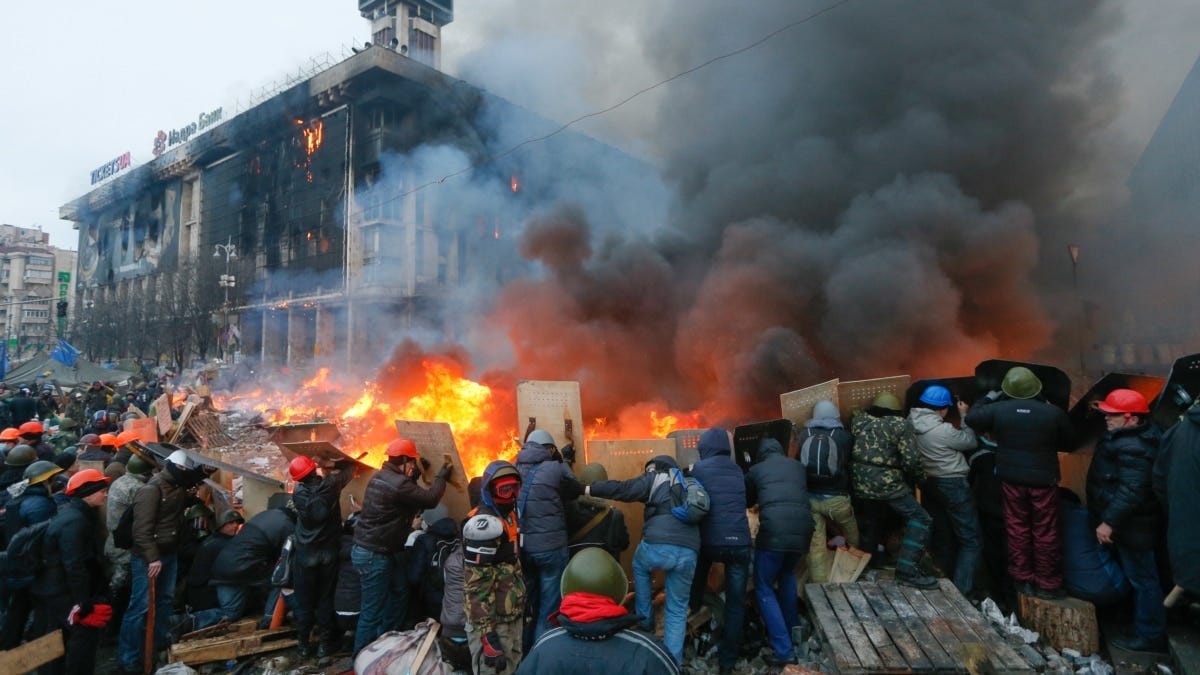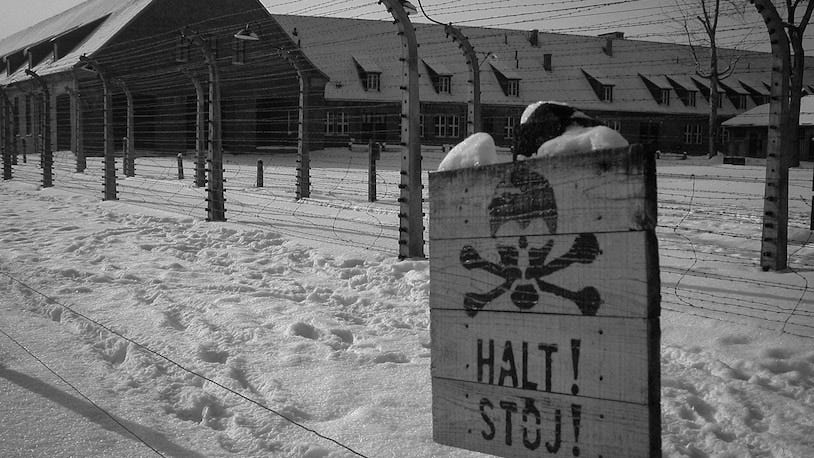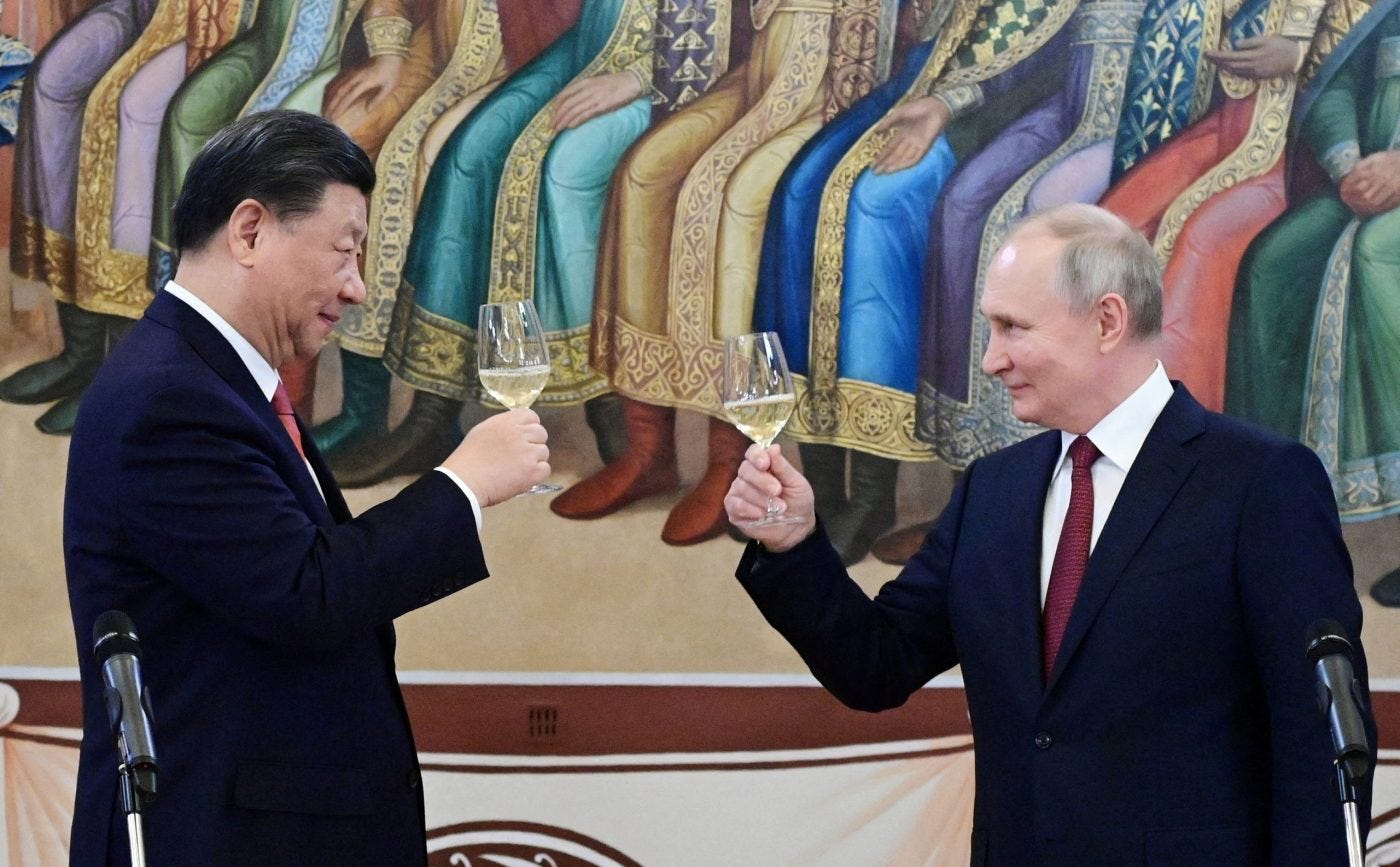May 13: Oleksandra Matviichuk, A Europe with a future: values must be protected
Matviichuk's speech as published in Ukrainska Pravda on May 9, 2023
A Europe with a future: values must be protected
Oleksandra Matviichuk speech delivered May 9, 2023, published by Ukrainska Pravda
This is the text of the Speech to Europe speech delivered by Oleksandra Matviychuk on May 9, 2023 - Europe Day. Every year, the Institute for the Humanities in Vienna (Institut für die Wissenschaften vom Menschen, IWM) invites a public intellectual to offer food for thought on the future of the "European project". IWM is an institute for advanced study in the humanities and social sciences that has been promoting intellectual exchange between East and West, between academia and society, and between disciplines and schools of science since 1982.
History is difficult to idealize if you know it. The twentieth century brought two devastating world wars, terrible colonial wars, millions of dead and the total depopulation of man, symbolized by the Holocaust and Nazi concentration camps. The terrible lessons of the past forced decisive action.
Responsibility for what was committed was rethought in the slogan "Never again." The leaders of the states created the UN system and signed international pacts. The Schuman Declaration marked the beginning of a single European project. The idea that every person is free and equal in their dignity and rights became the new post-war humanism.
But evil cannot be overcome once and for all. A person makes a choice every day. In addition, democracy, the rule of law and human rights have become a real practice only in part of Europe. In contrast, the Soviet totalitarian Gulag was never convicted or punished. Evil constantly returns with the massacre in Srebrenica, the destroyed half a million Grozny, the Russian bombing of Aleppo, the barrage of fire in Mariupol and the bodies of murdered people on the streets of Bucha.
How will we protect a person, his dignity, his rights and freedom in the twenty-first century? Can we rely on the law or only guns matter?
I ask these questions not only as a citizen of a country that defends itself against Russia's armed aggression. I ask these questions as a European citizen.
Europe must respond to the challenges of modernity. Europe has to fulfill its role in a global world where the confrontation between authoritarianism and democracy, interests and values, power and law, quick gains and the long term continues.
It is the determination to act that defines a civilization that has a future.
Europe that succeeded
The unification of coal and steel production was not just about providing common foundations for the development of the economy. The constructive efforts of the founders of the single European project have deepened the solidarity within the community of countries whose relations have been clouded by bloody disputes for so long. The European Union managed to overcome them and ensure peaceful relations between the participating countries. Continued efforts by governments to uphold democracy, the rule of law and human rights have ensured decades of stable development. This is the Europe that managed to avoid war.
Europe, which succeeded, is still going through a difficult path to itself. It must learn to see the toxic legacy of its own colonial past, even if it is now adorned with a newfound benevolence. It should build unity, but not uniformity, ensure integrity, but not homogeneity. It should be able to create solidarity out of diversity. It must prevent the ideas of authoritarianism and imperialism from sprouting in new generations.
The generations that survived the Second World War were replaced by others. People were no longer forced to shed blood. They inherited the values of democracy from their parents. And they began to take rights and freedoms as a given.
People increasingly manifest themselves not as carriers of these values, but as their consumers. They begin to understand freedom as a choice between cheeses in the supermarket. And therefore they are ready to exchange freedom for economic benefits, promises of security or personal comfort. It is not surprising that populist forces questioning the principles of the Universal Declaration of Human Rights are gaining weight in developed democracies.
After all, our world has become very fast, extremely complex and interconnected. Advances in technology, climate change, invasions of privacy, growing inequality, the devaluation of knowledge, and other global challenges demand answers that cannot be sought in the past. Decades of relative comfort and people's growing desire for simple solutions have changed the optics of advanced democracies. They stopped realizing that peace in Europe cannot be ensured without efforts commensurate with the level of danger.
The European Union is far from the whole of Europe. This is Europe, which managed to put into practice the principle that peace, progress and human rights are inextricably linked. And then it faced the threat of preservation.
Europe, which was able to, should support the movement of other countries towards the European civilizational space. In an ever-changing world, open systems and transformative cultures survive. And walls and borders do not save from global challenges. What loses energy dies.
Apart from the decisions and actions of Europe, which succeeded, the current state of affairs depends on its environment. It is one thing when you are surrounded by countries that have also defined for themselves the values of democracy, the rule of law and human rights as guidelines. It is a completely different matter when you are surrounded by countries that consider these values hostile. When they gain strength, they will seek to destroy you.
For a long time, Europe, which succeeded, behaved irresponsibly towards other countries in the region and contributed to the strengthening of authoritarian regimes. This Europe has forgotten that states that kill journalists, imprison activists or disperse peaceful demonstrations pose a threat not only to their citizens. Such states pose a threat to the entire region and peace in the world as a whole. Therefore, it was necessary to respond to systemic violations of human rights. Human rights should have been no less important factor in making political decisions than economic benefit or security. This approach had to be applied in foreign policy as well.
This is clearly visible on the example of Russia, which has consistently destroyed its own civil society. But developed democracies have turned a blind eye to this for a long time. They continued to shake hands with the Russian leadership, build gas pipelines and conduct "business as usual".For decades, Russian troops have committed crimes in various countries. But they always went unpunished. The world did not react properly even to the act of aggression and the annexation of Crimea, which became the first precedent in post-war Europe. Russia believed that it could do whatever it wanted.
Read also: "It's time to take responsibility." Speech at the awarding of the Nobel Peace Prize
Europe that could not
In February 2014, Russia started a war against Ukraine, occupied the Crimean peninsula and part of the Donetsk and Luhansk regions. By that time, the Revolution of Dignity had ended in Ukraine. Millions of people bravely stood up against an authoritarian and corrupt regime. They took to the streets across the country demanding the regime to continue moving towards the European civilizational space. They fought for the opportunity to build a state in which the rights of every person are protected, the government is accountable, the courts are independent, and the police do not beat peaceful student demonstrations.

And they paid the highest price for it. The police shot more than a hundred peaceful demonstrators in the central square of the capital. People died under the flags of Ukraine and the European Union.
When the authoritarian regime fell, Ukraine got a chance for democratic transformation. And to stop Ukraine on this path, Russia started this war in February 2014. And already in February 2022, it expanded it to a full-scale invasion. Because Putin is not afraid of NATO. Dictators fear the establishment of the idea of freedom.
Now Russia seeks to break the resistance and occupy Ukraine through the deliberate infliction of pain on the civilian population. Russian troops purposefully destroy residential buildings, churches, schools, museums, hospitals, shoot evacuation corridors, imprison people in infiltration camps, carry out forced deportations of the population, kidnap, torture and kill in the occupied territories. Europe could not stop it.
This war has a value dimension. Russia is trying to convince the Ukrainian people that their European integration choice was a mistake. Russia is trying to convince the whole world that democracy, the rule of law and human rights are false values. Because during the war they do not protect anyone.
Russia is trying to prove that a state with a powerful military potential and nuclear weapons can dictate its rules to the entire international community and even change internationally recognized borders.
It is not a war between two states, it is a war between two systems - authoritarianism and democracy. This war is going on in our house. People begin to understand this only when bombs fall on their heads, but war has other dimensions besides the military one - economic, informational, valuable. Whether we have the courage to admit it or not, this war has long since crossed the borders of the European Union.
Russia declared war on Europe. Russia is fighting against the values that define European civilization.
Europe must take responsibility. Democracy, the supremacy of human rights cannot be won once and for all. The values of modern civilization must be protected.
A Europe that is afraid
Europe does not know how to stop the war. And individual voices persistently call Ukraine for peace.
People in Ukraine want peace like no other. But peace does not come when the attacked country lays down its arms. Then it is not peace, but occupation. Occupation is another form of war.

Russia introduced terror in the occupied territories to keep them under control. This means that the Russian military and special services exterminate local active people - mayors, public figures, journalists, volunteers, priests, artists, etc. Neither age, nor gender, nor health is important. People do not have any opportunity to protect their freedom, property, life and their loved ones.
Occupation is not about changing one state flag to another. The occupation is about torture, deportations, forced adoptions, denial of identity, infiltration camps, mass graves.
The murdered Volodymyr Vakulenko was found in one of these graves under number 319 in the liberated Kharkiv Oblast . He was a children's writer. He wrote wonderful works for children and entire generations grew up on his books. During the Russian occupation, Volodymyr disappeared. His family hoped until the end that he was alive and, like thousands of other people, was in Russian captivity. It is difficult for them to come to terms with the results of identification.
Sustainable peace is the freedom to live without fear and take the long view. It is necessary to stop disguising postponed military threats as "political compromises". Calls for Ukraine to stop defending itself and satisfy Russia's imperial appetites are not just false. They are immoral.
People cannot be left to die and be tortured in the occupied territories. People's lives cannot be a "political compromise". To fight for peace is not to give in to the pressure of the aggressor, but to protect people from his cruelty.
Russia is a modern empire. The enslaved peoples of Belarus, Chechnya, Dagestan, Tatarstan, Yakutia and others are undergoing forced Russification, expropriation of natural resources, banning of their own language and culture, forced identity change. An empire has a center but no borders. An empire is always looking to expand. If Russia is not stopped in Ukraine, it will go further.
This is not a one-man war. This is the war of a people who, in their desire to restore "Russian greatness", lost the ability to distinguish between good and evil. And that is why he rejoices at the seizure of Ukrainian territories and denounces the father of Masha Moskalyova, who drew an anti-war picture at school. And now her father is in prison, and she herself is in an asylum.
The Russian people will bear responsibility for this shameful page of their history and the desire to forcefully revive the former empire. It is the awareness of this responsibility that motivates honest people to stand up to evil and call a spade a spade, even against prevailing public opinion. In Russia, these people are a marginal minority, but it is thanks to their courage that Russians will never be able to say that they simply did not know that killing people is evil.
After a full-scale invasion, Ukraine survived thanks to the willingness of the Ukrainian people to defend freedom and democratic choice, as well as due to the support of developed democracies. They said, let's help Ukraine not to lose. Now they say, we will be with you as long as this lasts. But this paradigm needs to be changed. And instead of helping Ukraine not to lose, think and act in such a way as to help Ukraine win quickly.
A Europe that is afraid is tempted to avoid responsible decisions. Europe, which is afraid, behaves as if the global challenges will one day disappear by themselves. But the truth is that they only get worse. We are just wasting time.
A Europe with a future
War turns people into numbers. The scale of war crimes is growing so rapidly that it is simply impossible to tell all the stories. But I will tell you one thing. The story of Svitlana, who lost her entire family after a Russian rocket hit her house.
"I heard how they died. The man was breathing, straining, as if he was trying to throw off the stove, but he couldn't. For a moment, he simply froze. Grandma and Zhenya died instantly. I heard my daughter cry. In a moment, she also fell silent. About my son's mother said that he called me several times and kept quiet."
As long as the military dimension of the war is limited to the borders of Ukraine, Europe, which has succeeded, can exclude news about war crimes and avoid looking at terrible photos and videos. Millions of people in Ukraine cannot do this. We cannot rule out war. This horror became our life.
People are not numbers. We must ensure justice for all people, regardless of who they are, their social status, the type of crime and cruelty they have suffered, and whether foreign media and international organizations are interested in their fate. We need to give people their names back. And with them human dignity. Because every person's life matters.
We still see the world through the lens of the Nuremberg Tribunal, where war criminals were convicted only when the Nazi regime fell. But justice should not depend on the stability of authoritarian regimes. After all, we live in a new century. Justice must not wait.
It is up to us to break this cycle of impunity and change approaches to justice for war crimes. We must create an international tribunal and bring Putin, Lukashenko and other war criminals to justice. Yes, this is a bold move. But it is necessary to prove that democracy is effective, the rule of law works, and justice exists, even if delayed.
It is the role of Europe that determines its future.Being a European means showing solidarity in the struggle for the values of democracy, the rule of law and human rights. This means not taking a pose, but an active position.
It is not only a question of how we will protect people in the 21st century. Thanks to its multiculturalism and complex history, Europe has the potential to redefine what humanism is in an age of rapid technological progress and to give new dimensions to the meaning of humanity.
A Europe that could help build a world that could. Europe can play a key role in creating an international system of cooperation that unites developed democracies and states that are undergoing or are confidently on the path to democratization. Such a union should not be defined by a common past, economic development or geographical continent, but by common values and civilizational attitudes.
Because human rights are about a way of thinking, about a certain paradigm of world perception that determines how a person thinks and will act. Therefore, it is not enough to pass the right laws or create formal institutions. Society's values will still be stronger.
This means that we need a new humanist movement that will work with society at the level of meaning, engage in education, form mass support and involve people in the protection of rights and freedoms. This movement should unite intellectuals and civil societies of different countries, because the ideas of freedom and human rights are universal.
When the law temporarily does not work and we cannot rely on it, we can still always rely on people. Even if we don't have political tools, we always have our own word and position. Ordinary people have a lot more influence than they realize. The voice of millions of people in different countries can change world history faster than the intervention of the United Nations.
Our future is uncertain and not guaranteed.Europe of the 21st century can become a world of humanism, or it can strike again with crimes of unprecedented brutality. Europe has a shared responsibility to overcome global challenges and embark on a new path of world understanding.
Europe is not so much about geography as, first of all, about the values of modern civilization. We live in a world where values do not have national borders. And only spreading the idea of freedom makes our world safe.
Oleksandra Matviychuk , head of the Center for Civil Liberties







